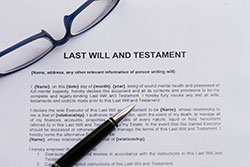|
|
Southern California Estate Planning, Probate, Trust & Litigation Law Blog
Monday, December 14, 2015

During the estate planning process, your attorney will draft a number of legal documents such as a will, trust and power of attorney which will help you accomplish your goals. While these legal documents are required for effective planning, they may not sufficiently convey your thoughts and wishes to your loved ones in your own words. A letter of instruction is a great compliment to your “formal” estate plan, allowing you to outline your wishes with your own voice.
This letter of instruction is typically written by you, not your attorney. Some attorneys may, however, provide you with forms or other documents that can be helpful in composing your letter of instruction. Whether your call this a "letter of instruction" or something else, such a document is a non-binding document that will be helpful to your family or other loved ones.
There is no set format as to what to include in this document, though there are a number of common themes.
First, you may wish to explain, in your own words, the reasoning for your personal preferences for medical care especially near the end of life. For example, you might explain why you prefer to pass on at home, if that is possible. Although this could be included in a medical power of attorney, learning about these wishes in a personalized letter as opposed to a sterile legal document may give your loved ones greater peace of mind that they are doing the right thing when they are charged with making decisions on your behalf. You might also detail your preferences regarding a funeral, burial or cremation. These letters often include a list of friends to contact upon your death and may even have an outline of your own obituary.
You may also want to make note of the following in your letter to your loved ones:
- an updated list of your financial accounts with account numbers;
- a list of online accounts with passwords;
- a list of important legal documents and where to find them;
- a list of your life insurance and where the actual policies are located;
- where you have any safe deposit boxes and the location of any keys;
- where all car titles are located; the
- names of your CPA, attorney, banker, insurance advisor and financial advisor;
- your birth certificate, marriage license and military discharge papers;
- your social security number and card;
- any divorce papers; copies of real estate deeds and mortgages;
- names, addresses, and phone numbers of all children, grandchildren, or other named beneficiaries.
In drafting your letter, you simply need to think about what information might be important to those that would be in charge of your affairs upon your death. This document should be consistent with your legal documents and updated from time to time.
Monday, December 7, 2015

There are many reasons why a person might leave a spouse or another loved one out of his or her will. It is possible that the will in question was executed prior to a marriage and was never properly updated. It may also be the case that the husband and wife, though still technically married, are estranged, and do not contribute to one another’s support. An end of life revelation of a past infidelity may anger a spouse enough to rewrite his or her last will and testament. Individuals may make rash decisions to disinherit spouses based on a single argument or misunderstanding. This can be exacerbated by symptoms of dementia. Regardless of the reason, a person who is not named in his or her spouse’s will may petition the court for the spousal share to receive a portion of the estate.
The spousal share of an estate, also called an elective share, is a holdover from the concept of dower in English common law. Traditionally, dower is a portion of a man’s estate guaranteed to a wife when she is widowed to ensure that she does not fall into poverty after her husband dies. The practice continues today without the same restrictions on gender. Every state in America has a provision in its laws to protect an individual whose spouse dies from being left with nothing. Similar provisions for children also exist in some states. Attempts have been made to introduce legislation to protect unmarried romantic partners the same way as married couples, but these attempts have had little success.
The structure of these protections vary from state to state. The value of the estate for the purposes of establishing the spousal share may include the widow’s assets depending on the jurisdiction. Some states provide a widowed spouse a larger share of the deceased’s estate than others, but almost every state prohibits an individual from disinheriting a spouse entirely. The one state that does not permit an elective share to the spouse in a probate case requires that an estate pay a disinherited spouse financial support for up to one year after the death.
Monday, November 30, 2015

There are several reasons that a will may prove invalid. It is important for testators to be aware of these pitfalls in order to avoid them.
Improper Execution
The requirements vary from state to state, but most states require a valid will to be witnessed by two people not named in the will. Some jurisdictions require the document to be notarized as well. Although these restrictions may be relaxed if the will is holographic (handwritten), it is best to satisfy these requirements to ensure that the testamentary document will be honored by the probate court.
Lack of Testamentary Capacity
Anyone over the age of 18 is presumed to understand what a will is. At the end of life, individuals are often not in the best state of mind. If court finds that an individual is suffering from dementia, is under the influence of drugs or alcohol, or is incapable of understanding the document being executed for some other reason, the court may invalidate the will on the grounds that the individual does not have testamentary capacity.
Replacement by a Later Will
Whenever an individual writes a new will, it invalidates all wills made previously. This means that a will might be believed to be valid for months until a more recently executed document surfaces. The newest will always takes precedence, controlling how assets should be distributed.
Lack of Required Content
Every will is required to contain certain provisions to carry out its purpose. These provisions, ensure that the testator understands the reason for executing the document. Although these provisions vary from state to state, some are common to all jurisdictions. It should be clear that the document is intended to be a will. The document should demonstrate an individual’s wishes in regard to what should happen to his or her property after death. A proper will should also include a provision to appoint an executor to act as an agent for the estate and enforce the terms of the will. If the document lacks any of these provisions, the will may be declared invalid.
Undue influence or fraud
A will that was executed under undue influence, coercion or fraud will be invalidated by a court. If a will has been presented to a testator for a signature as if it were any other document, like a power of attorney or a business contract, the court will find that the will was fraudulently obtained and will not honor it. If an individual providing end of life care with exclusive access to the testator threatens to stop care unless a will is modified, that modification is considered to be the result of undue influence and the court will not accept it.
Monday, November 16, 2015

Most people develop an estate plan as a way to transfer wealth, property and their legacies on to loved ones upon their passing. This transfer, however, isn’t always as seamless as one may assume, even with all of the correct documents in place. What happens if your eldest son doesn’t want the family vacation home that you’ve gifted to him? Or your daughter decides that the classic car that was left to her isn’t worth the headache?
When a beneficiary rejects a bequest it is technically, or legally, referred to as a "disclaimer." This is the legal equivalent of simply saying "I don't want it." The person who rejects the bequest cannot direct where the bequest goes. Legally, it will pass as if the named beneficiary died before you. Thus, who it passes to depends upon what your estate planning documents, such as a will, trust, or beneficiary form, say will happen if the primary named beneficiary is not living.
Now you may be thinking why on earth would someone reject a generous sum of money or piece of real estate? There could be several reasons why a beneficiary might not want to accept such a bequest. Perhaps the beneficiary has a large and valuable estate of their own and they do not need the money. By rejecting or disclaiming the bequest it will not increase the size of their estate and thus, it may lessen the estate taxes due upon their later death.
Another reason may be that the beneficiary would prefer that the asset that was bequeathed pass to the next named beneficiary. Perhaps that is their own child and they decide they do not really need the asset but their child could make better use of it. Another possible reason might be that the asset needs a lot of upkeep or maintenance, as with a vacation home or classic car, and the person may decide taking on that responsibility is simply not something they want to do. By rejecting or disclaiming the asset, the named beneficiary will not inherit the "headache" of caring for, and being liable for, the property.
To avoid this scenario, you might consider sitting down with each one of your beneficiaries and discussing what you have in mind. This gives your loved ones the chance to voice their concerns and allows you to plan your gifts accordingly.
Monday, November 2, 2015

The conversation about a person’s last wishes can be an awkward one for both the individual who is the topic of conversation and his or her loved ones. The end of someone’s life is not a topic anyone looks forward to discussing. It is, however, an important conversation that must be had so that the family understands the testator’s final wishes before he or she passes away. If a significant sum is being left to someone or some entity outside of the family, an explanation of this action may go a long way to avoiding a contested will. In a similar vein, if one heir is receiving a larger share of the estate than the others, it is prudent to have this action explained. If funds are being placed in a trust instead of given directly to the heirs, it makes sense for the testator to advise his or her loved ones in advance.
When a loved one dies, people are often in a state of emotional turmoil. Each deals with grief differently and, often, unpredictably. Anger is a common reaction to loss, one of the five stages postulated to apply to everyone dealing with such a tragedy. Simply by talking to loved ones ahead of time, a testator can preempt any anger misdirected at the estate plan and avoid an unnecessary dispute, be it a small family tiff or a prolonged legal battle.
The executor of the estate must be privy to a significant amount of information before a testator passes on. It is helpful for the executor to know that he or she has been chosen for this role and to have accepted the appointment in advance. The executor should know the location of the original will. Concerns of fraud mean that only the original copy of a will can be entered into probate. The executor should be aware of all bank accounts, assets, and debts in a testator’s name. This will avoid a tedious search for documents after the decedent passes on and will ensure that all assets are included as part of the estate. The executor of an estate should be aware of all memberships, because it will be the executor’s responsibility to cancel them. An up-to-date accounting of all assets and debts will simplify the settlement of the estate for an executor significantly.
Monday, October 26, 2015

An executor's fee is the amount charged by the person who has been appointed as the executor of the probate estate for handling all of the necessary steps in the probate administration. Therefore, if you have been appointed an executor of someone’s estate, you might be entitled to a fee for your services. This fee could be based upon a variety of factors and some of those factors may be dependent upon state, or even local, law.
General Duties of an Executor
- Securing the decedent's home (changing locks, etc.)
- Identifying and collecting all bank accounts, investment accounts, stocks, bonds and mutual funds
- Having all real estate appraised; having all tangible personal property appraised
- Paying all of the decedent’s debts and final expenses
- Making sure all income and estate tax returns are prepared, filed and any taxes paid
- Collecting all life insurance proceeds and retirement account assets
- Accounting for all actions; and making distributions of the estate to the beneficiaries or heirs.
This list is not all-inclusive and depending upon the particular estate more, or less, steps may be needed.
As you can see, there is a lot of work (and legal liability) involved in being the executor of an estate. Typically the executor would keep track of his or her time and a reasonable hourly rate would be used. Other times, an executor could charge based upon some percent of the value of the estate assets. What an executor may charge, and how an executor can charge, may be governed by state law or even a local court's rules. You also asked whether the deceased can make you agree not to take a fee. The decedent can put in his or her will that the executor should serve without compensation but the named executor is not obligated to take the job. He or she could simply decline to serve. If no one will serve without taking a fee, and if the decedents will states the executor must serve without a fee, a petition could be filed with the court asking them to approve a fee even if the will says otherwise. Notice should be given to all interested parties such as all beneficiaries.
If you have been appointed an executor or have any other probate or estate planning issues, contact us for a consultation today.
Monday, October 19, 2015

A life estate is a special designation in probate law referring to a gift to a family member that lasts as long as the life of the recipient. If an individual uses a life estate as part of his or her estate plan, whatever is bequeathed under the life estate will revert back to the residual estate upon the death of the life estate recipient. It is most common in scenarios where an individual starts a new family without children later in life and wants to ensure that the present spouse is taken care of for the remainder of her or his life. The owner of a life estate is called a life tenant. A life estate is often used as an alternative to a trust because it provides the life tenant with more control over the transferred asset.
A life tenant may treat an asset as his or her own. A home may be rented to tenants for income. The life tenant may sell his or her interest in the property to the heirs of the residual estate or to third parties. If the property is sold to a third party, that third party must surrender the property to the residual heirs upon the death of the life tenant.
Though the property belongs to the life tenant, the life tenant has a duty to the residual heirs to keep the property reasonably maintained and in good condition. He or she has an obligation to avoid mortgage arrearages and tax liens while in possession of the property. Exploiting natural resources on the property may be restricted during a life tenancy. A life tenant may not bequeath his or her interest in a life estate through a will because that interest immediately terminates upon the life tenant’s death. Significant changes to the property need to be agreed upon by all parties.
Though there are benefits, there are also drawbacks to establishing a life estate as part of an estate plan. The action could create estate tax issues for the tenant’s estate. In addition, creditors of the tenant may attach liens on the property, creating complicated legal issues for the heirs of the residual estate.
Monday, October 5, 2015

Estate planning is designed to fulfill the wishes of a person after his or her death. Problems can easily arise, however, if the estate plan contains unanswered questions that can no longer be resolved after the person's demise. This can, and frequently does, lead to costly litigation counter-productive to the goals of the estate. It is important that will be written in language that is clear and that the document has been well proofread because something as simple as a misplaced comma can significantly alter its meaning.
Planning for every possible contingency is a significant part of estate planning. Tragic scenarios in which an estate planner’s loved ones predecease him or her, though uncomfortable, must be considered during the preparation of a will to avoid otherwise unforeseen conflicts.
Even trained professionals can make significant mistakes if they are not well versed in estate planning. An attorney who practices general law, while perfectly capable of preparing simple wills, may not understand the intricacies of trusts and guardianships. A great many attorneys, not aware of the tax consequences of bequests involving IRAs, may leave heirs with unnecessary financial obligations. If an attorney is not knowledgeable enough to ask the proper questions, he or she will be unable to prepare an estate plan that functions efficiently and ensures the proper distribution of the estate's assets.
In spite of the wealth of an individual, the estate may be cash deficient if that wealth is tied up in assets at the time of the individual's death. Problems can also result if an estate planner has distributed assets into joint bank accounts or accounts with pay on death provisions. If the executor of the estate does not have access to funds to pay the estate's bills or taxes, the heirs of the estate may run into trouble.
Even if estate planning is handled well from a logistical point of view, lack of communication with loved ones can interfere with a will's desired execution. A tragedy that incapacitates the testator can occur suddenly, so it is imperative that a savvy estate planner confers with loved ones as soon as possible, making them aware of any future obligations, such as life insurance premiums that must be paid and informing them of the location of any probate documents and inventories of assets. Such conversations ensure that the individual's wishes will be carried out without complications or delay in the event of an unexpected incapacity.
In addition to communicating logistical information, it is also essential to schedule a personal conversation with loved ones that makes clear any sentimental bequests or large gifts that require explanation. This avoids the shock or discomfort that may arise after one's death during which a well-thought-out decision is questioned as impulsive or irrational. Such direct communication of one's plans avoids unnecessary envy, arguments or rivalry among family and friends.
Consulting with attorneys who specialize in estate planning is the cornerstone of creating a plan to ensure that one's desires are carried out and that all the bases are covered. Estate planning attorneys serve as invaluable repositories of all information necessary to strategizing a plan that not only meets one's personal needs and desires, but is legally binding.
Monday, September 28, 2015

How can I control my assets after death?
The practice of estate planning is dedicated to preserving an individual’s control over his or her assets after death. A simple will can control which individuals receive what assets, but a more thorough plan has the potential to do much more. Establishing a trust is the most common method used to exercise this kind of control.
A trust can issue a bequest restricted by a condition; for example, a trust might be established to pay out $10,000.00 to a specific grandchild only once he or she has reached 18 years of age. Multiple payments can be made to the beneficiaries as long as the trust is funded. The trust can stipulate that the grandchild may have to graduate from college to receive the money, or even that he or she must graduate from a specific school with a minimum grade-point average or membership in a particular fraternity or sorority.
A trust can make the condition of payment as specific or as broad as the creator of the trust wishes. It may, for instance, bequeath benefits to a humanitarian organization on condition that the organization continues to provide food and shelter to the homeless. There is no limit to the number of conditions permissible in a trust document. Even when the conditions go against public policy and general norms and mores established by society, as long as the conditions may be met legally, they will be upheld by the court.
In order to create a trust, there must be a capital investment to fund it and a trustee must be named. The trustee is responsible for protecting the assets of the trust, investing them to the best of his or her ability, managing real estate and other long-term assets, interpreting the trust document, communicating regularly with the beneficiaries of the trust and performing all of these actions with a high level of integrity. Trust assets may be used to pay for expenses of managing the trust as well as to provide a stipend for the trustee if so provided for in the trust document.
If a trust document is not well written, it may be the target of a lawsuit seeking to dissolve the trust and disburse the assets held therein. Even if the trust is defended successfully, the costs of this challenge may deplete its coffers and frustrate the very reason for its creation. In order to avoid these possible pitfalls, it is imperative that a trust document be drafted by an attorney with a high degree of experience in estate planning law.
Monday, September 14, 2015

Will - a written document specifying a person’s wishes concerning his or her property distribution upon his or her death.
In order to be enforced by a court of law, a will must be signed in accordance with the applicable wills act.
Testator/Testatrix - the person who signs the will.
Heirs - beneficiaries of an estate.
Executor/Executrix - the individual given authority by the testator to make decisions to put the testator’s written directions into effect.
Once the will is entered into probate, the executor’s signature is equivalent to the testator’s. The executor has a legal duty to the heirs of the estate to act in the best interest of the estate, and may collect a fee for performing such service.
Administrator/Administratrix - the person who assumes the role of the executor when a person dies without a will (intestate).
The Administrator must apply with the local probate office and may be required to provide a bond to be held in escrow as collateral for control over the assets of the estate.
Codicil - an amendment to a will.
In order to be valid, a codicil must comply with all the requirements of the applicable wills act.
Holographic Will- a handwritten will.
Holographic wills are often exempt from requirements of the applicable wills act.
Bequest - a gift given by the testator to his or her heirs through a will.
Residual Estate - the balance of a testator’s belongings after debts have been paid and specific bequests have been distributed.
Intestate - not having signed a will before one dies; a person who dies without having signed a will.
Life Estate - a bequest that gives an heir the right to have exclusive use of a property for the remainder of his or her life, but without the power to transfer such property upon the death of that heir.
The property will transfer to the heirs of the residual estate after the death of the beneficiary of the life estate.
Per stirpes - a Latin phrase precisely translated as “by the branch” meaning that, if an heir named in the will dies before the testator, that heir’s share will be divided equally among that beneficiary’s own heirs.
An alternative to per capita, described below.
Per capita - a Latin phrase precisely translated as “by the head” meaning that, if an heir named in the will dies before the testator, that heir’s share will be divided among the testator’s remaining heirs.
An alternative to per stirpes, described above.
While it is a good idea to have a basic understanding of fundamental estate planning vocabulary, this cannot serve as a substitute for the services of an experienced attorney.
Monday, September 7, 2015

This question presents a fairly common issue posed to estate planning attorneys. The solution is also pretty easy to address in your will, trust and other estate planning documents, including any guardianship appointment for your minor children.
First, its important to note that you should not delay establishing an estate plan pending the birth of a new child. In fact, if your planning is done right you most likely will not need to modify your estate plan after a new child is born. The problem with waiting is that you cannot know what tomorrow will bring and you could die, or become incapacitated and not having any type of plan is a bad idea.
In terms of how an estate plan can provide for “after-born” children, there are a few drafting techniques that can address this issue. For example, in your will, it would refer to your current children typically by name and their date of birth. Then, your will would provide that any reference to the term "your children" would include any children born to you, or adopted by you, after the date you sign your will.
In addition, in the section or article of your will that provides how your estate and assets will be divided, it could simply provide that your estate and assets will be divided into separate and equal shares, one each for "your children." That would mean that whatever children you have at the time of your death would receive a share and thus the will would work as you intend, even if you did not amend it after having a new child.
On a side note, you should make certain that your plan does not give the children their share of your estate outright while they are still young. Rather, your will or living trust should provide that the assets and money are held in a trust structure until they are reach a certain age or achieve certain milestones such as college graduation or marriage. Any good estate planning attorney should be able to advise you about this and help walk you through the various options you have available to you.
Law Offices of Mary P. Kulvinskas located in Westlake Village, CA serves clients in southern CA including Agoura, Calabasas, Camarillo, Los Angeles, Malibu, Oxnard, Simi Valley, Thousand Oaks, San Fernando Valley, and Ventura.
|
|
 |
|